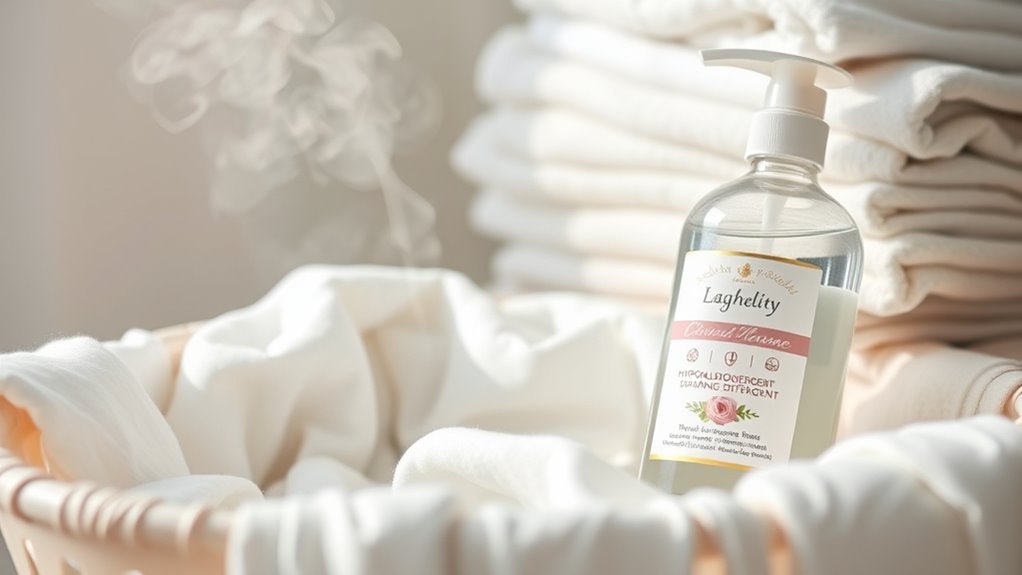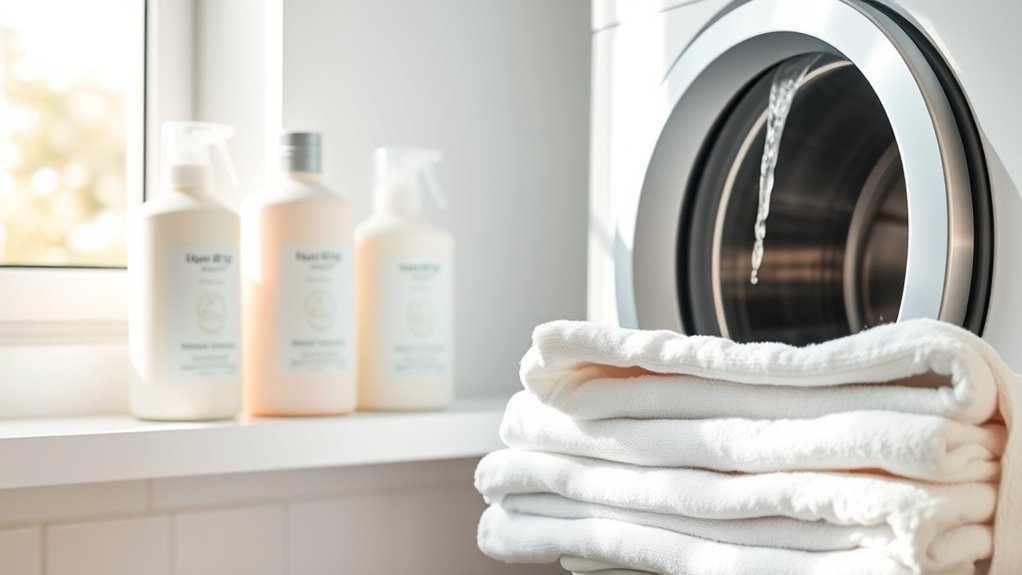To protect your sensitive skin during laundry, choose hypoallergenic detergents free from dyes, fragrances, and harsh chemicals. Use natural fabric softeners like white vinegar and perform an extra rinse to remove residues. Opt for natural fibers such as cotton or bamboo and avoid synthetic materials. Proper drying and washing routines help prevent irritation, while maintaining clean appliances reduces allergens. Keep these tips in mind to keep your skin comfortable—there’s more to learn for barrier-free laundry habits.
Key Takeaways
- Use hypoallergenic, fragrance-free detergents and follow recommended amounts to prevent skin irritation from residues.
- Opt for natural fabric softeners like white vinegar and avoid chemical-laden softeners.
- Perform an extra rinse cycle and air dry clothes to reduce chemical and dust residues.
- Choose natural fibers such as cotton and bamboo, and wash new clothes before wearing.
- Maintain clean drying appliances and use gentle laundry practices to minimize allergen exposure.

If you have sensitive skin, laundry routines can make a big difference in reducing irritation. The products you choose and how you handle your laundry can considerably impact your skin’s comfort. Start by selecting hypoallergenic detergents designed specifically for sensitive skin. These detergents are free from dyes, fragrances, and harsh chemicals that often trigger reactions. Using a gentle, hypoallergenic detergent ensures that residues left on your clothes won’t cause redness, itching, or rashes. It’s essential to follow the recommended amount when washing; using too much can leave irritating residues on fabrics.
In addition to choosing the right detergent, consider fabric softener alternatives. Traditional fabric softeners often contain chemicals and fragrances that can irritate sensitive skin. Instead, opt for natural options like white vinegar or specialized natural fabric softeners that are free from synthetic fragrances and chemicals. White vinegar not only softens fabrics but also helps break down detergent residues that might be lingering on your clothes. You can add half a cup of vinegar to your rinse cycle to achieve softness without risking irritation. If you prefer commercial softener alternatives, look for products labeled as hypoallergenic or suitable for sensitive skin, ensuring they are free from dyes and fragrances.
Another tip is to thoroughly rinse your clothes to remove any remaining detergent or softener residues. A second rinse cycle can help eliminate irritants that might cling to fabrics after washing. Also, avoid overloading your washing machine, as this can prevent proper rinsing and lead to residue buildup. When drying, opt for air drying whenever possible. Using a dryer with a clean filter minimizes the transfer of dust and allergens to your clothes. If you use a dryer, consider adding dryer balls made from natural wool or silicone, which can help reduce static and soften fabrics naturally without chemicals. Additionally, choosing natural fibers like cotton and bamboo can further reduce skin irritation compared to synthetic materials.
Finally, be mindful of the fabrics you wear. Natural fibers like cotton and bamboo tend to be gentler on sensitive skin than synthetic materials. Wash new clothes before wearing them to remove any manufacturing residues or chemicals. Regularly wash your bedding, pillowcases, and towels in hypoallergenic detergents to minimize skin irritation from prolonged contact. By paying attention to your laundry routine and choosing gentle, chemical-free products, you can substantially reduce skin irritation and enjoy more comfortable, irritation-free days.
Frequently Asked Questions
Are Natural Detergents More Effective for Sensitive Skin?
Yes, natural detergents are often more effective for sensitive skin because they lack harsh chemical fragrances that can cause irritation. They typically contain gentle, plant-based ingredients that clean well without stripping your skin’s natural oils. Additionally, natural detergents usually preserve enzyme effectiveness in breaking down stains, making them a safe and efficient choice. You’ll notice fewer skin reactions while still maintaining clean, fresh clothing.
How Often Should I Wash New Clothes Before Wearing?
You should wash new clothes before wearing them at least once, especially if they’re made from sensitive skin-friendly clothing materials like cotton or bamboo. Washing frequency helps eliminate any residual chemicals or dyes that could irritate your skin. For best results, use a gentle, natural detergent suited for sensitive skin. This step ensures your skin stays comfortable and reduces the risk of irritation from unfamiliar fabrics.
Can Fabric Softeners Cause Skin Irritation?
Yes, fabric softeners can cause skin irritation, especially if you have fabric softener allergies or chemical sensitivities. The fragrances and chemicals in many softeners may trigger allergic reactions or skin irritation. To avoid this, opt for fragrance-free or hypoallergenic options, or skip softeners altogether. Always test new products on a small skin area first, and wash new clothes thoroughly to reduce potential irritants.
Do Dryer Sheets Impact Sensitive Skin?
Dryer sheets can wreak havoc on your skin sensitivity, like tiny warriors invading your softest layers. They often contain fragrances and chemicals that trigger irritation and rashes, turning your laundry routine into a battleground. If you have sensitive skin, avoid using dryer sheets altogether. Instead, opt for fragrance-free alternatives or natural options like wool dryer balls, which protect your skin and keep your clothes fresh without the harsh chemicals.
Are Hypoallergenic Laundry Products Truly Safer?
Hypoallergenic laundry products are generally safer if you have chemical sensitivities or fragrance allergies, but they’re not foolproof. They’re formulated to reduce irritating ingredients, but some still contain dyes or fragrances that might trigger reactions. You should check labels carefully, and opt for unscented, natural options when possible. Testing a small load first can help guarantee your laundry doesn’t cause irritation or allergic reactions.
Conclusion
By choosing gentle laundry habits, you’re nurturing your skin like a delicate garden. Every wash becomes a tender embrace, helping you sidestep the prickly thorns of irritation. With these simple tips, you’ll create a soft sanctuary for your skin to thrive, turning laundry time into a soothing ritual rather than a bothersome chore. Embrace the gentle touch, and let your skin feel cherished in every clean, fresh moment.









